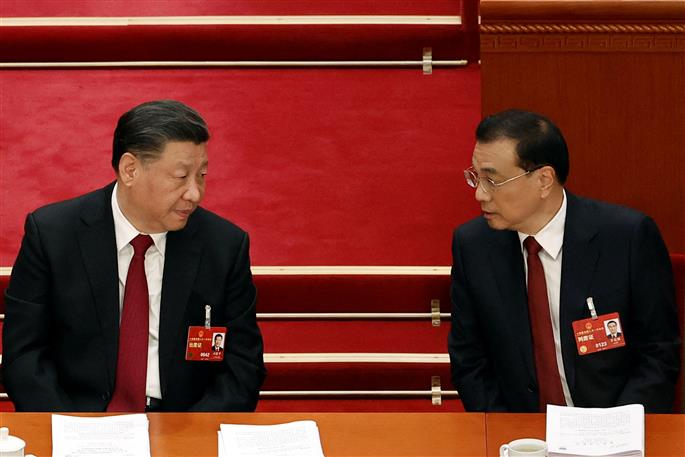BEIJING: China set a modest target for economic growth this year of around 5% on Sunday as it kicked-off the annual session of its National People’s Congress (NPC), which is poised to implement the biggest government shake-up in a decade.
China’s gross domestic product (GDP) grew by just 3% last year, one of its worst showings in decades, squeezed by three years of COVID-19 restrictions, crisis in its vast property sector, a crackdown on private enterprise and weakening demand for Chinese exports.
In his work report, outgoing Premier Li Keqiang stressed the need for economic stability and expanding consumption, setting a goal to create around 12 million urban jobs this year, up from last year’s target of at least 11 million, and warned that risks remain in the real estate sector.
Li set a budget deficit target at 3.0% of GDP, widening from a goal of around 2.8% last year.
“We should give priority to the recovery and expansion of consumption,” said Li, who spoke for just under an hour in a speech to open the parliament, which will run through March 13.
“The incomes of urban and rural residents should be boosted through multiple channels. We should stabilize spending on big-ticket items and promote recovery in consumption of consumer services,” he said.
This year’s growth target of around 5% was at the low end of expectations, as policy sources had recently told a range as high as 6% could be set. It is also below last year’s target of around 5.5%.
“While the official growth target has been lowered for the second consecutive year, which might be a disappointment to the market, we reckon investors (should) pay attention to the underlying growth momentum to gauge the recovery pace,” said Zhou Hao, economist at Guotai Junan International.
Li and a slate of more reform-oriented economic policy officials are set to retire during the congress, making way for loyalists to President Xi Jinping, who further tightened his grip on power when he secured a precedent-breaking third leadership term at October’s Communist Party Congress.
During the NPC, former Shanghai party chief Li Qiang, a longtime Xi ally, is expected to be confirmed as premier, tasked with reinvigorating the world’s second-largest economy.
The rubber-stamp parliament will also discuss Xi’s plans for an “intensive” and “wide-ranging” reorganisation of state and Communist Party entities, state media reported on Tuesday, with analysts expecting a further deepening of Communist Party penetration of state bodies.
MILITARY BUDGET RISE
Li said China’s armed forces should devote greater energy to training under combat conditions and boost combat preparedness, and the budget included a 7.2% increase in defence spending this year, a slightly bigger increase than last year’s budgeted 7.1% rise and again exceeding expected GDP growth.
On Taiwan, Li struck a moderate tone, saying China should promote the peaceful development of cross-Strait relations and advance the process of China’s “peaceful reunification”, but also take resolute steps to oppose Taiwan independence.
Beijing faces a host of challenges including increasingly fraught relations with the United States and a worsening demographic outlook, with plunging birth rates and a population drop last year for the first time since the famine year of 1961.
China plans to lower the costs of childbirth, childcare and education and will actively respond to an ageing population and a decrease in fertility, the nation’s state planner said in a work report released on Sunday.
The NPC opened on a smoggy day amid tight security in the Chinese capital, with 2,948 delegates gathered in the cavernous Great Hall of the People on the west side of Tiananmen Square.
During the session, China’s legislature will vote on a plan to reform institutions under the State Council, or cabinet, and decide on a new cabinet line-up for the next five years, according to a meeting agenda.
It is the first NPC meeting since China abruptly dropped its zero-COVID policy in December, following rare nationwide protests. Excluding the pandemic-shortened meetings of the previous three years, this year’s session will be the shortest in at least 40 years.









































